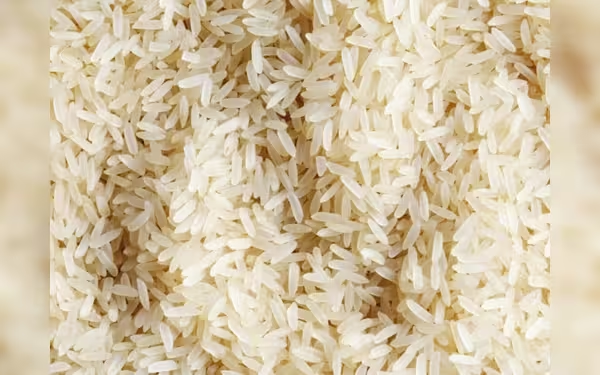Saturday, November 16, 2024 08:28 PM
Pakistani Rice Secures Lowest Bid in Indonesia's 500,000 Ton Tender
- Indonesian tender seeks 500,000 tons of rice.
- Pakistani rice offered at $479 per ton.
- Indonesia plans to import 3.6 million tons this year.
 Image Credits: brecorder
Image Credits: brecorderPakistani rice offers the lowest bid in Indonesia's tender for 500,000 tons, highlighting competitive pricing amid rising import needs.
In recent developments, the Indonesian state purchasing agency, Bulog, has initiated an international tender to procure approximately 500,000 metric tons of rice. This move comes as Indonesia seeks to stabilize its domestic rice prices following a disappointing harvest. The tender has attracted various offers, with Pakistani rice being highlighted for its competitive pricing.
According to European traders, the lowest price offered for rice sourced from Pakistan was estimated at $479 per ton, cost and freight (c&f). This price positions Pakistani rice as the most affordable option in the tender. However, it is important to note that no purchases have been finalized yet, and negotiations regarding prices are expected to continue in the coming days. A decision on the tender is anticipated next week.
In addition to the lowest offer from Pakistan, two other bids for rice from the same country were reported at $484 and $485 per ton, c&f. Comparatively, the lowest offer for rice from Vietnam was $515, while offers from Thailand and Cambodia were at $511, India at $513, and Myanmar at $517.50 per ton, all c&f for consignments ranging from 25,000 to 30,000 tons.
This tender is part of Indonesia's broader strategy to enhance its rice supply amid a projected decline in domestic production. The country's rice output for 2024 is estimated at 30.34 million metric tons, reflecting a decrease of 2.43% from the previous year. The most significant drop occurred during the January to April period, where production fell nearly 15% year-on-year. To address this shortfall, Indonesia plans to import up to 3.6 million tons of rice this year and is considering increasing its planted area in 2025.
Furthermore, the new tender specifically seeks white rice of 5% broken grade from the 2024 crop year, which must be milled no longer than six months ago. This requirement underscores the importance of quality in the procurement process.
The competitive pricing of Pakistani rice in this tender not only highlights the country's potential in the global rice market but also reflects Indonesia's urgent need to secure rice supplies. As negotiations unfold, the outcome will be closely watched, as it could significantly impact both countries' agricultural sectors. The ongoing developments in this tender serve as a reminder of the interconnectedness of global food markets and the importance of strategic planning in agriculture.













